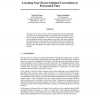117 search results - page 6 / 24 » Self-evaluated Learning Agent in Multiple State Games |
ATAL
2011
Springer
12 years 7 months ago
2011
Springer
Motivated by a machine learning perspective—that gametheoretic equilibria constraints should serve as guidelines for predicting agents’ strategies, we introduce maximum causal...
NIPS
2003
13 years 8 months ago
2003
We study how to learn to play a Pareto-optimal strict Nash equilibrium when there exist multiple equilibria and agents may have different preferences among the equilibria. We focu...
ICML
1994
IEEE
13 years 11 months ago
1994
IEEE
In the Markov decision process (MDP) formalization of reinforcement learning, a single adaptive agent interacts with an environment defined by a probabilistic transition function....
ICML
2003
IEEE
14 years 19 days ago
2003
IEEE
Reinforcement learning has been used for training game playing agents. The value function for a complex game must be approximated with a continuous function because the number of ...
UAI
2000
13 years 8 months ago
2000
Cooperative games are those in which both agents share the same payoff structure. Valuebased reinforcement-learning algorithms, such as variants of Q-learning, have been applied t...

